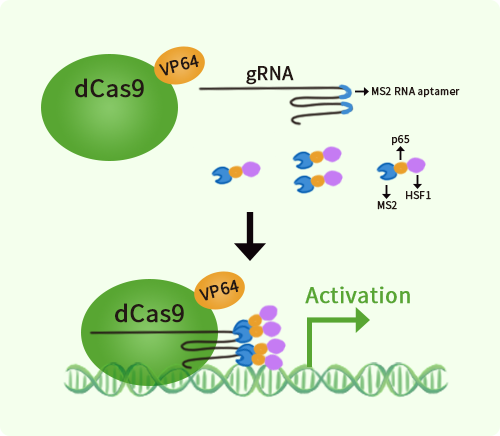Mouse Eif2ak2 activation kit by CRISPRa
CAT#: GA203386
Eif2ak2 CRISPRa kit - CRISPR gene activation of mouse eukaryotic translation initiation factor 2-alpha kinase 2
CNY 12,255.00
Specifications
| Product Data | |
| Format | 3 gRNAs (5ug each), 1 scramble ctrl (10ug) and 1 enhancer vector (10ug) |
| Symbol | Eif2ak2 |
| Locus ID | 19106 |
| Kit Components | GA203386G1, Eif2ak2 gRNA vector 1 in pCas-Guide-GFP-CRISPRa GA203386G2, Eif2ak2 gRNA vector 2 in pCas-Guide-GFP-CRISPRa GA203386G3, Eif2ak2 gRNA vector 3 in pCas-Guide-GFP-CRISPRa 1 CRISPRa-Enhancer vector, SKU GE100056 1 CRISPRa scramble vector, SKU GE100077 |
| Disclaimer | These products are manufactured and supplied by OriGene under license from ERS. The kit is designed based on the best knowledge of CRISPRa SAM technology. The efficiency of the activation can be affected by many factors, including nucleosome occupancy status, chromatin structure and the gene expression level of the target, etc. |
| Reference Data | |
| RefSeq | NM_011163 |
| Synonyms | 2310047A08Rik; 4732414G15Rik; AI467567; AI747578; Pkr; Prkr; Tik |
| Summary | IFN-induced dsRNA-dependent serine/threonine-protein kinase which plays a key role in the innate immune response to viral infection and is also involved in the regulation of signal transduction, apoptosis, cell proliferation and differentiation. Exerts its antiviral activity on a wide range of DNA and RNA viruses including west nile virus (WNV), sindbis virus (SV), foot-and-mouth virus (FMDV), semliki Forest virus (SFV) and lymphocytic choriomeningitis virus (LCMV). Inhibits viral replication via phosphorylation of the alpha subunit of eukaryotic initiation factor 2 (EIF2S1), this phosphorylation impairs the recycling of EIF2S1 between successive rounds of initiation leading to inhibition of translation which eventually results in shutdown of cellular and viral protein synthesis. Also phosphorylates other substrates including p53/TP53, PPP2R5A, DHX9, ILF3 and IRS1. In addition to serine/threonine-protein kinase activity, also has tyrosine-protein kinase activity and phosphorylates CDK1 at 'Tyr-4' upon DNA damage, facilitating its ubiquitination and proteosomal degradation. Either as an adapter protein and/or via its kinase activity, can regulate various signaling pathways (p38 MAP kinase, NF-kappa-B and insulin signaling pathways) and transcription factors (JUN, STAT1, STAT3, IRF1, ATF3) involved in the expression of genes encoding proinflammatory cytokines and IFNs. Activates the NF-kappa-B pathway via interaction with IKBKB and TRAF family of proteins and activates the p38 MAP kinase pathway via interaction with MAP2K6. Can act as both a positive and negative regulator of the insulin signaling pathway (ISP). Negatively regulates ISP by inducing the inhibitory phosphorylation of insulin receptor substrate 1 (IRS1) at 'Ser-312' and positively regulates ISP via phosphorylation of PPP2R5A which activates FOXO1, which in turn up-regulates the expression of insulin receptor substrate 2 (IRS2). Can regulate NLRP3 inflammasome assembly and the activation of NLRP3, NLRP1, AIM2 and NLRC4 inflammasomes. Can trigger apoptosis via FADD-mediated activation of CASP8. Plays a role in the regulation of the cytoskeleton by binding to gelsolin (GSN), sequestering the protein in an inactive conformation away from actin. Regulates proliferation, differentiation and survival of hematopoietic stem/progenitor cells, induction of cytokines and chemokines and plays a role in cortex-dependent memory consolidation.[UniProtKB/Swiss-Prot Function] |
Documents
Resources
| 基因表达相关资源 |
Other Versions
| SKU | Description | Size | Price |
|---|---|---|---|
| KN505092 | Eif2ak2 - KN2.0, Mouse gene knockout kit via CRISPR, non-homology mediated. |
CNY 8,680.00 |
其它Eif2ak2产品


 United States
United States
 Germany
Germany
 Japan
Japan
 United Kingdom
United Kingdom
 China
China

